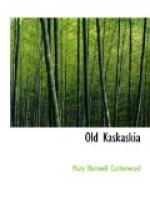“Pierre, it is plain to be seen that you do not know how to deal with young ladies. They like best to be fought over. It is not proper to tell her we are willing to have her. The way to do is to drive off the other suitors.”
“But there are so many. Tante Isidore says all the young men in Kaskaskia and the officers left at Fort Chartres are her suitors. Monsieur Reece Zhone is the worst one, though. I might ask him to go out to papa’s office with me to-night, but we shall be sent to bed directly after supper. Besides, here sits his sister who was carried out fainting.”
“While he is in our house we are obliged to be polite to him,” said Odile. “But if I were a boy, I would, some time, get on my pony and ride into Kaskaskia”—The conspiring went on in whispers. The children’s heads bobbed nearer each other, so Peggy overheard no more.
It was the very next evening, the evening of St. John’s Day, that young Pierre rode into Kaskaskia beside his father to see the yearly bonfire lighted. Though many of the old French customs had perished in a mixing of nationalities, St. John’s Day was yet observed; the Latin race drawing the Saxon out to participate in the festival, as so often happens wherever they dwell.
The bonfire stood in the middle of the street fronting the church. It was an octagonal pyramid, seven or eight feet high, built of dry oak and pecan limbs and logs, with straw at all the corners.
The earth yet held a red horizon rim around its dusky surface. Some half-distinct swallows were swarming into the church belfry, as silent as bats; but people swarming on the ground below made a cheerful noise, like a fair. The St. John bonfire was not a religious ceremony, but its character lifted it above the ordinary burning of brushwood at night. The most dignified Kaskaskians, heretics as well as papists, came out to see it lighted; the pagan spell of Midsummer Night more or less affecting them all.
Red points appeared at the pile’s eight corners and sprung up flame, showing the eight lads who were bent down blowing them; showing the church front, and the steps covered with little negroes good-naturedly fighting and crowding one another off; showing the crosses of slate and wood and square marble tombs in the graveyard, and a crowd of honest faces, red kerchiefs, gray cappos, and wooden shoes pressing close around it. Children raced, shouting in the light, perpetuating unconsciously the fire-worship of Asia by leaping across outer edges of the blaze. It rose and showed the bowered homes of Kaskaskia, the tavern at an angle of the streets, with two Indians, in leggins and hunting-shirts, standing on the gallery as emotionless spectators. It illuminated fields and woods stretching southward, and little weeds beside the road whitened with dust. The roaring and crackling heat drove venturesome urchins back.
Father Baby could be seen established behind a temporary counter, conveniently near the pile, yet discreetly removed from the church front. Thirsty rustics and flatboat men crowded to his kegs and clinked his glasses. The firelight shone on his crown which was bare to the sky. Father Olivier passed by, receiving submissive obeisance from the renegade, but returning him a shake of the head.




